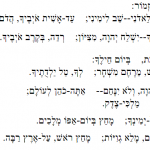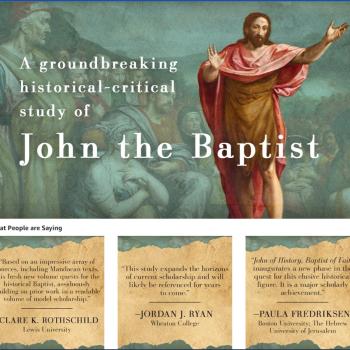This post relates to the book project that I’ve taken the first steps towards working on as a major focus the academic year after next, on the historical figure of John the Baptist. There is a longstanding puzzle I’ve wrestled with, and recently had some ideas about, and having put them in writing in an email for someone who was interested in the topic, I thought I would also share them here.
The Mandaeans use the term Nasoreans (Mandaic nasurai) to refer to themselves, sometimes with particular reference to those initiated into the deeper truths of their faith tradition. The use of the term Nazorean in the New Testament, and the appearance of this and related terms in the church fathers (particularly Epiphanius), has often led scholars to wonder whether the term might not have been in use prior to and independently of Christianity. That Jesus’ movement would sometimes be labeled as “Nazarenes” is also puzzling, since it is not at all common for an entire movement to be labeled by the place its central figure was from. For the Mandaeans to have taken the term over from Christians seems unlikely in the extreme. Many scholars have tried to find an alternative origin for the term than as having to do with Nazareth, but Charles Haberl (the Semitic philologist with whom I collaborated on the Mandaean Book of John project) has spent some time working on this and has recently drawn the conclusion that a connection with the place name Nazareth is indeed the best explanation for the various forms of name that we encounter across an array of sources.
It struck me that the problem arises in particular because of our uncritical acceptance of the information provided by Luke (who places the parents of John in the hill country of Judaea), or the information in the Mandaean Book of John (which has John born in Jerusalem). The fact that they don’t agree precisely is itself interesting, and could be explained in a variety of ways. If both (or perhaps, for that matter, a common source that lies behind them) are simply making assumptions about where priests lived, then that opens the door for us to consider the possibility that John might have been from Nazareth in Galilee. If he was, and Jesus was part of his movement and also was, then the nickname derived from Nazareth becomes more readily explicable. This would also in turn explain other things that few seem to have felt need explanation, such as why several other disciples of John’s who later become followers of Jesus were also from Galilee, and why John ends up in conflict with Herod Antipas and imprisoned by him, given that Herod ruled over Galilee and Transjordan but not Judaea.
I’m not sure where this line of thought will lead yet, since this possibility has occurred to me very recently. I may end up deciding that this way of solving the mystery of the Nasoreans doesn’t work. But it is one of the many things that I’ll explore as part of this project, and a nice illustration of how bringing Mandaean sources into the picture, without either assuming they are preferable or dismissing them as useless, leads to interesting avenues worth exploring.
What do readers of the blog think of this possibility?
Of related interest: Phil Long blogged about the death of John the Baptist in Josephus and Matthew 14:1-12. Andrew Perriman shared some thoughts on the account of Jesus’ baptism and temptation in the wilderness in the Gospel of Mark. James Tabor explored whether John the Baptist or anyone else literally anointed Jesus as the Messiah, i.e. as the Anointed One. According to Craig Keener, “Luke’s narrative lacks the fictitious elaborations about a distant land characteristic of reports in novels and novelistic sources. Luke’s details, sparse as they are, display a higher proportion of accuracy than in even many historians’ speculations; they certainly lack the colorful but inaccurate depictions common in fiction.” I’m excited by the appearance of a new book by Gabriele Mayer, Im Namen des Großen Lebens: Johannes der Täufer im Johannesbuch der Mandäer. A 1907 article about John the Baptist in the Mandaean Book of John is digitized and online. Also, as we wait for Yuhana Nashmi’s book of Mandaean stories and art to become available beyond Australia, there are some videos from the book launch event in his YouTube channel. Here is one of them:














